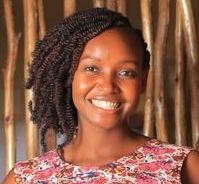Meet the Council: Sheila Ronoh
The DSA reserves two positions on its council for student representatives as this is an important way to connect with those who have recently graduated or are undertaking their PhD in a development related area.
- Scroll down to read more about Sheila
- Meet Jonathan Fisher, Emma Mawdsley, and Touseef Mir

Joining us on the Council for her first term in 2023 is Sheila Ronoh, a second year Doctoral Researcher at the Institute of Peace and Security within the The Centre for Trust, Peace and Social Relations at Coventry University. Her Phd will look at youth activism, leadership and civic engagement for the climate and sustainability in the Mediterranean, Middle East and Africa region.
“I have a passion for climate and sustainability themes,” Sheila explains. ‘Ït is shaped by my awareness of the impact of climate change particularly in vulnerable countries and also drawing from my work engagements so far.” Prior to embarking on her doctoral journey, Sheila worked for GIZ (German Development Cooperation) in Kenya and Somalia for five years. Part of her role included spearheading the corporate sustainability process and within this capacity, I organised several strategy workshops with project focal points. She is also a member of the Kenya Climate Change Working Group and part of the Youth and Marginalised people thematic group.
“As part of the KCCWG steering committee, we collaborate with NGOs and local governments on projects aimed at enhancing the resilience of vulnerable populations in Kenya. When I therefore saw the opportunity for a PhD in Youth Activism for Climate and Sustainability at Coventry University, I was very excited about it. With a background in International Relations and my engagements in the climate and sustainability space, I must confess the subject of my research project could never have been more spot on!”
Being new to the UK to undertake her PhD, her first contact with the DSA was when she learned about the opportunity to present her work at the PhD masterclass, which takes place before the DSA conference. The PhD masterclass allows candidates to get feedback from experts in their research area from outside their usual supervision.
“After attending the masterclass, I was getting to know all the other sessions at the DSA conference and I got interested in what they were doing,” she said. “I thought this is a great opportunity to share the word with other PhD researchers at Coventry University who are researching topics relevant to the DSA. So then I applied to be a student representative. I saw this as an opportunity to represent students’ interests to the network as well as leverage with professionals in my area.
Sheila would like to see the existing opportunities for students offered by the DSA to be more widely known. These include the PhD student masterclasses which are open to all students, and the dissertation and thesis prizes which are open to candidates within institutes who are institutional members.
She also has suggestions for how the DSA can widen engagement for students that she would like taken forward during her term. “Give opportunities for people to present their work and ongoing research. Host workshops and networking platforms where PhDs and early career researchers can meet, share and learn from each other because there is power in that.”
Sheila is also a role model for those considering taking a PhD after a work history rather than as a research focussed career path. “It’s certainly a different orientation [to undertake a PhD after some work history”, she says. “But it was not so hard for me to transition into study/research mode. I completed my second Master’s degree in International Relations in September 2022 and so the world of research was still very fresh to me.”
“While I undertook the Masters programme, I was working full time and so I had to take the classes in the evenings. Being a young mom also made everything so difficult, since I could barely sleep through the night after long and hectic days. I am happy though to be in this space, where I can now focus on my research and in an area that I am very passionate about.”
Sheila said that networking and collaborating has been key to helping her progress in her first year of PhD research. “It has been a journey shaping the theoretical framework for my research and setting up plans for my fieldwork, but my supervisors have really been helpful,” she says. “I especially love to network with colleagues and scholars working on similar research topics, whether within the research centre at the University or even in conferences.”
“I am a member of the social movements working group here at Coventry University that brings together various scholars investigating social movements every other month. Through such collaboration forums, I got fresh insights and challenged myself to think critically and this helped me quite a lot in my research. Sharing areas where I am having challenges with fellow researchers also helped me with getting various perspectives that proved helpful.”
She also cites engaging with the DSA network and conference as a great way to collaborate – honestly we didn’t even ask her to say that! DSA membership is priced at £11 for those studying in the UK and Sheila encourages PhD candidates to join. “The DSA is a good platform to engage as it’s a network of so many scholars. I was wowed at the first conference! There is a lot of opportunity to network and engage with others scholars working in the same field so please join and learn and share. There is a lot we can share as early career researchers and of course lots that we can learn.”
